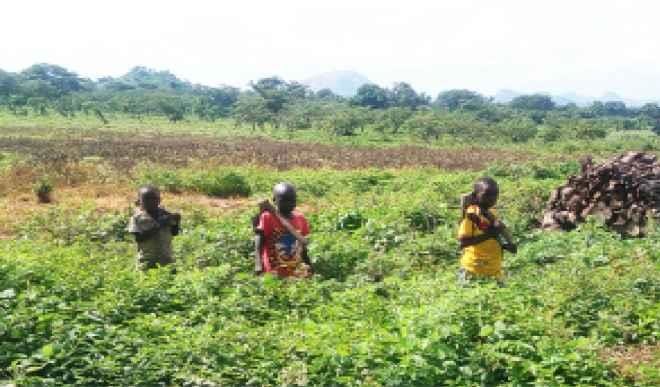Tunga Ashere, where children out of school for farming
In urban cities, children usually start school from Nursery or even pre-nursery. But children in Tunga Ashere do not enrol in school until they are seven years old, a year older than the enrolment age. This is because they needed to be strong enough to trek the long distance to school daily, some parents told […]


In urban cities, children usually start school from Nursery or even pre-nursery. But children in Tunga Ashere do not enrol in school until they are seven years old, a year older than the enrolment age. This is because they needed to be strong enough to trek the long distance to school daily, some parents told Daily Trust.
The community, which is in Jiwa Chiefdom, Abuja Municipal Area Council (AMAC), has a number school age children sweating on farms instead of taking lessons in classrooms.
To acquire primary education in the public school in Tunga Nasara, a neighbouring community, pupils trekked about two kilometres; while getting secondary school education comes at even greater cost and farther distance.
The community head, Sani Yakubu, recently said more than 200 children in the community are out of school due to the long distance they have to trek to school daily.
Most parents want to enrol their children but nobody was ready to take the risk of allowing a child trek about two kilometres daily along a bush path crawling with reptiles and harsh weather conditions.
They feared there is no place for the children to relax or rest when tired during the trip which is typically between 1pm and 2pm and the temperature usually about 30 degrees centigrade.
So most of the children, Aso Chronicle learnt, either accompanied their parents, who are predominantly farmers, to the farm or spent their day playing at the community’s square.
“Since there is no school in the community, they go to farm as most of their parents are farmers,” Yakubu said.
Another resident, Madaki Jafar-Ashere, said acquiring formal education in the community is difficult due to the unfavourable conditions they are made to face. He said children are enrolled in school after their seventh birthday because, “by then they would be strong enough to trek the long distance.”
Jafar said despite the effort of the community leaders in ensuring that young people are educated, most of them still prefer farming to schooling. He said since the farms are closer and the environment somehow friendly, they go in company of relatives and could eat on the farm, many children opt for farming.
One of the few children that attend the primary school in Tunga Nasara, Sadiq Yakubu Ashere, said he leaves the community as early as 6am so that he gets to school before 8am.
He said on most cases he only recovers from the long trek several minutes rest while the return journey home is usually stressful due to the scorching sun and during the rainy season, it gets more difficult.
Jafar said the entire community can only boast of three graduates of the College of Education
Recounting his experience, one of the students at the College of Education, Zuba, Madaki Kasimu, said trekking to school was not restricted to primary and secondary school students only, “I also trek to school,” he lamented.
Kasimu said the pupils are however at risk of speeding motorcycles and reckless motorists along the snaking road to the community. He added that the roads are always worsened during the wet season thereby making it difficult for the pupils and students to get to school on time, if they were able to go at all.
The condition of the school in Tunga Nasara is no better.
The community head, Musa Babe Bina, said the school is riddled with leaking roofs among other challenges.
Another resident, Musa Yamau said during rainfall two sections of primary four pupils are merged in a class thereby making it overcrowded while the rain lasts.
“Some will not even hear what the teachers are saying,” he said.
Another resident, Yunusa Shu’aibu, said some of the pupils in the community stopped attending school after their primary education because it takes another long trek to Tunga Madaki or Zuba to attend secondary school.
“And the farm is less than 30 minutes,” he said, while explaining why some of the children prefer farming to attending school.
The fate of the pupils in Tunga Ashere now hangs on the shoulders of the three residents that hold a Nigeria Certificate in Education (NCE), a special A-level grade course intended for secondary school leavers.
One of the NCE holders that graduated in 2017, Jafar, said they planned to hold preparatory classes for the children to ensure they did not stay at home idle while they await for the right schooling age in the community.
Residents of Tunga Ashere said the government would be securing the future of the children with the establishment of a primary school after a non-governmental organisation had failed in its attempt to provide one.
They also appealed to the government to consider extending the on-going electricity projects in neighbouring communities to them.
This, when done, would put an end to the spending of money on purchase of petrol to fuel generators, the only power source in the community.
The Permanent Secretary, Federal Ministry of Education, Adamu Hussaini, had said Nigeria has more than half of the out-of-school children in the world.
He said of the 20 million out-of-school children in the world, 10.5 million are in Nigeria, explaining that the number was made up of several categories of children including girl-child, children of migrant fishermen and farmers.
